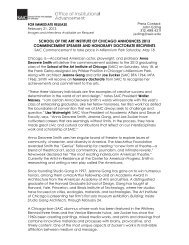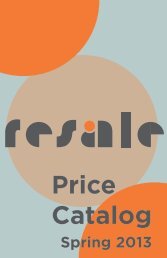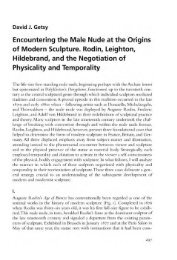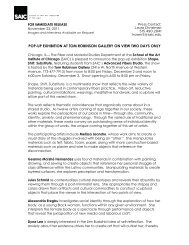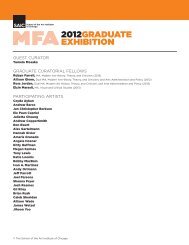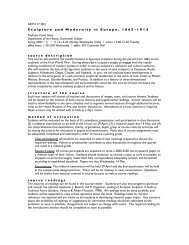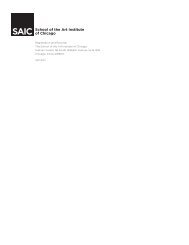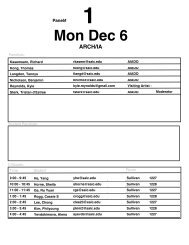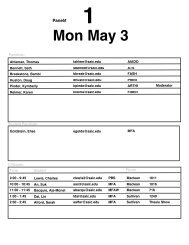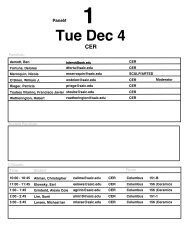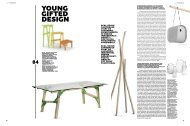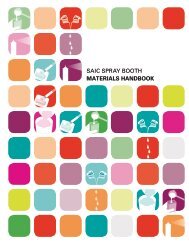i. institutional support and commitment to continuous improvement
i. institutional support and commitment to continuous improvement
i. institutional support and commitment to continuous improvement
Create successful ePaper yourself
Turn your PDF publications into a flip-book with our unique Google optimized e-Paper software.
Course Number & Title:<br />
ARCH & INARC 6214 Cycle Ecologies (3)<br />
Course Description:<br />
This technical practice course introduces the concep-<br />
tual <strong>and</strong> practical basis for sustainable approaches <strong>to</strong><br />
design at all scales.<br />
Course Goals & Objectives:<br />
1) Design practice: The course serves as a founda-<br />
tion class in the cultural <strong>and</strong> practical knowledge<br />
of sustainability necessary <strong>to</strong> develop one’s own<br />
approach <strong>to</strong> a sustainable architecture practice. The<br />
course will introduce students <strong>to</strong> issues relevant <strong>to</strong><br />
LEED certification <strong>and</strong> will include a critical ex-<br />
amination of the LEED approach of the US Green<br />
Building Council.<br />
2) Building science skills: Focuses on developing<br />
investigative skills allowing students <strong>to</strong> effectively<br />
choose <strong>and</strong> incorporate sustainable approaches<br />
<strong>and</strong> systems during pre <strong>and</strong> schematic design.<br />
3) Building science knowledge: The class examines<br />
various active, passive <strong>and</strong> material assembly strat-<br />
egies for the creation of ecologically stable build-<br />
ings that are energy, water <strong>and</strong> resource efficient.<br />
Student Performance Criterion:<br />
1) Best exemplifies the following criteria:<br />
a) B.3. Sustainable Design (ability)<br />
2) Additional criteria<br />
a) B.7. Financial Issues (underst<strong>and</strong>ing)<br />
b) B.8. Environmental Systems (underst<strong>and</strong>ing)<br />
c) B.12. Building Materials & Systems (underst<strong>and</strong>ing)<br />
d) C.2. Human Behavior (underst<strong>and</strong>ing)<br />
Topical Outline:<br />
1) Design practice: The course focuses exten-<br />
sively on methods of professional practice that<br />
reorder traditional interaction of the architectural<br />
collabora<strong>to</strong>rs in order <strong>to</strong> incorporate ecological ap-<br />
proaches thoroughly in<strong>to</strong> the design <strong>and</strong> delivery<br />
processes. Subjects include integrated project<br />
delivery, life cycle costing methods, establishment<br />
of performance criteria <strong>and</strong> methods for meeting<br />
criteria. 30% of class.<br />
2) Building science skills: His<strong>to</strong>rical examples <strong>and</strong><br />
contemporary case studies placing the building<br />
as an expression of performance over form, are<br />
reviewed. The class is paced by workbook scale<br />
exercises examining <strong>and</strong> recording building system<br />
performance. Exercises include investigations of<br />
energy production <strong>and</strong> conservation methods,<br />
building envelope, heating <strong>and</strong> cooling systems<br />
<strong>and</strong> lighting systems; 35% of class.<br />
181 | Spring 2011<br />
IV. Supplemental Information<br />
3) Building science knowledge: Theories of biologi-<br />
cal ecologies, material production ecologies, <strong>and</strong><br />
population dynamics, emphasizing the impact of<br />
human culture <strong>and</strong> patterns of consumption on<br />
underlying environmental quality. Practical systems<br />
studied include natural ventilation, evaporative<br />
cooling, pho<strong>to</strong>voltaic’s, heat exchangers, wind tur-<br />
bines <strong>and</strong> fuel cells. 35% of class.<br />
Prerequisites:<br />
All required fourth semester courses.<br />
Textbooks/Learning Resources:<br />
Various sources including:<br />
• U.S. Green Building Council LEED Resources<br />
<strong>and</strong> Tools.<br />
Offered (semester <strong>and</strong> year):<br />
• Semester: FALL<br />
• Year: THREE<br />
Faculty assigned:<br />
• 2010-2011 academic year:<br />
Coleman, Cynthia (F/T), Ahleman, Thomas<br />
(P/T),<br />
Supplemental Information<br />
SECTION IV



